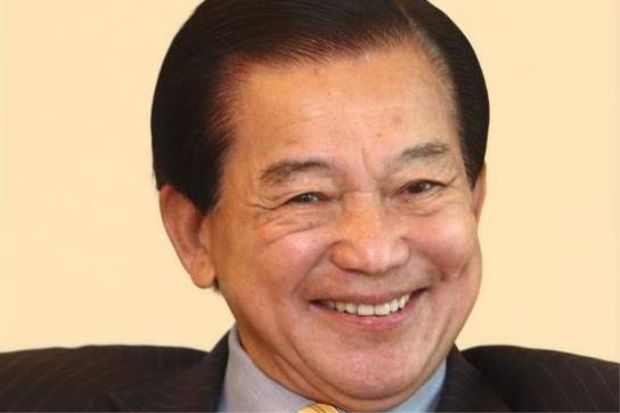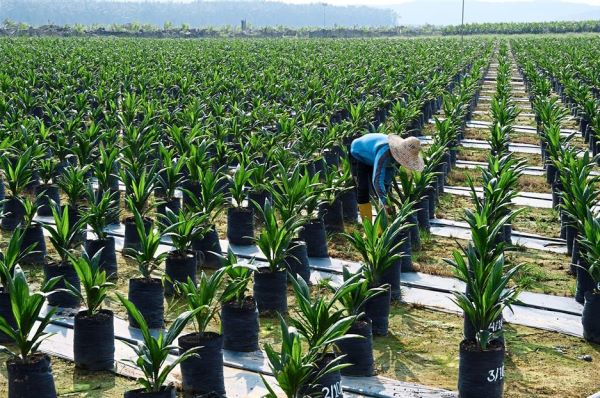
IOI Group’s executive chairman Tan Sri Lee Shin Cheng — LOW BOON TAT/The Star
IOI Group’s executive chairman Tan Sri Lee Shin Cheng talks about his personal journey as an industry veteran and shares some insight into the palm oil sector.
HE calls the oil palm trees his “girlfriends”, bought over the company that had earlier rejected his job application and knows the plantation business inside out.
IOI Group’s executive chairman Tan Sri Lee Shin Cheng walks with a vigour that belies his 78 years of age. But he has certainly trekked an arduous path to reach where he is today. Lee is known for his sharp business acumen, and as a hands-on industry leader who practically works seven days a week.
Lee grew up in a rubber estate in Jeram, Kuala Selangor, where his late father ran a small sundry shop.
At 11, he stopped schooling to help supplement his family income by selling ice cream from a heavy, metal box perched at the back of an adult’s bicycle.When it rained, the paths would get so muddy, welding his bicycle wheels to the ground.
Unable to pedal on, the pint-sized Lee would support the ice-cream box with his shoulders till help came along. Guarding his ice-cream was a priority for it’s a precious day’s earnings. It was such tough situations that moulded and honed Lee’s strengths and pioneering spirit.
Lee eventually went back to school, realising that the only way out of the cycle of hardship was through education.

Estate workers at a nursery nurturing high-yielding clones to boost productivity.
Today, Lee is an established business leader and industry veteran. In 2015, he was conferred the Palm Oil Industry Leadership Award (Pila) by the Malaysian Palm Oil Council.
Lee shared his personal journey and insights on the palm oil industry with The Star.
Tan Sri, you have come a long way in the industry, starting from being a field supervisor over 50 years ago, to becoming an estate manager, to being founder and executive chairman of IOI Group. How would you describe your journey so far?
I have been involved in the oil palm plantation industry for about 56 years. I started my career in the plantation as a field supervisor on Jan 1, 1961. Oil palm is something very close to my heart and also my first love because I feel that it is something very sustainable and versatile, as well as very useful to mankind. It can be used for so many purposes; both edible and non-edible. More importantly, this industry has helped planters to become entrepreneurs and thousands of smallholders have become middle-class earners.
IOI is a local plantation company which started its business in 1982. Within a short span of less than 30 years, IOI Group has transformed into one of the world’s leading palm oil players with operations in seven countries. We have steadily moved up the palm oil value chain over the years and I can tell you now that IOI is the most fully integrated plantation company in the world.
When you applied for a job at Dunlop Estate in the early 1960s, they rejected your application. But in 1989, you acquired the company. Looking back, what were the learning points from that experience?
I attended Chinese school, so I picked up my English here and there. After reaching Senior Middle Three (equivalent to Form Five), I applied for a job in an English-based plantation company (Dunlop Estates). At that time, most of the plantation companies were managed by orang putih. I went for an interview but was rejected due to my poor English, even though I could answer almost all their questions on plantations. I was very disappointed but I decided to work harder and not give up.
I then found a field supervisor job at another smaller plantation company. I learnt everything I could and gave my best at work. I rose through the ranks and worked all the way to become a full-fledged estate manager. As a manager, I picked up even more skills from planning planting schedules, estate management and even construction, since I was responsible for building the estate’s labourers’ quarters. All these experiences and skills contributed to my success in the later years.

Soap noodles, a palm-based derivative, produced by IOI Oleochemical is highly sought-after globally due to its versatility in the production of various soap-based products — Photos: IOI
Subsequently, when I made enough money, I acquired Dunlop Estates. The acquisition of Dunlop Estates was one of the significant achievements in my life. I remember some analysts came to see me and ask why was I buying a plantation company, considered a sunset industry then. I said that I see its potential and replied that, “Today sunset, tomorrow sunrise.”
From these experiences, I learnt that education is very important in one’s life; hence I put a lot of focus on our national educational developments as one of IOI’s CSR initiatives. Besides that, determination is also very important. We should never give up on our dreams. If we work hard enough, we will achieve our dream or goal one day.
I read in an article that you talk to the oil palm trees in the plantations. Why do you do that?
Ahhh, yes, my trees are my “girlfriends” and each of them has their own characteristics. When I visit my estates, I will talk to them to encourage them to bloom and bear more fruits. Now, I don’t talk to them but I whisper to them!
This is the 100th year of the palm oil industry in Malaysia. In your opinion, what are the three milestones of the industry?
Today, the palm oil sector is one of the few areas that Malaysia can truly claim to be a global leader. Some of the Malaysian palm oil companies are recognised as world-class players in the multi-billion global oils and fats industry.
When I first started out in the plantation sector in 1961, oil palm was a secondary crop, far behind rubber in its scale and revenue contribution to the country.
In the 1970s and 80s, it surpassed rubber to become the most important commodity crop for Malaysia. For many years in the 1980s and 1990s, Malaysia was the largest palm oil producer in the world. I recall that during the 1997/98 Asian economic crisis, palm oil was the second largest foreign exchange earner for Malaysia and helped the country to recover quickly from the crisis.
Palm oil’s success as a crop and commodity product cannot be disputed. To me, an equally significant development is the evolvement of the palm oil commodity sector into a multi-faceted industry with products encompassing many sectors such as food ingredients, personal care, detergents, plastics, energy and health care. Its byproducts, namely, the EFB (empty fruit bunches) fibres, kernel shells and effluent are spawning a whole range of uses covering fuel, paper pulp, furniture and electricity.
In celebration of 100 years of palm oil in Malaysia, what is your message to readers?
I am very optimistic about the future of palm oil. It will be good for the next 100 years because palm oil is environmentally-friendly, sustainable and very versatile, both for industry uses as well as being an edible source.
Today, in spite of my age, I am still working as hard as I was 56 years ago in trying to increase the potential of oil palm yield, widen the geographical spread of palm oil products in the world and push the boundaries where palm oil can be applied and used. Increasing the productivity of the palm oil industry is very important at the moment. The industry now produces four tonnes of CPO (crude palm oil) per hectare per annum in Malaysia. Actually, our planting materials are capable of producing eight tonnes of CPO per hectare per annum, if we have enough workers to do the job, as well as good management teams, which is also something lacking in the industry now.
